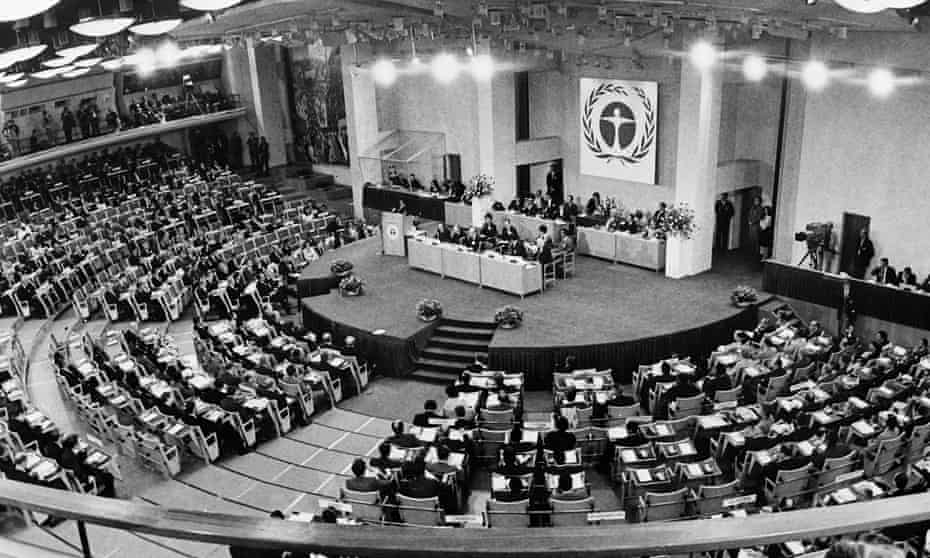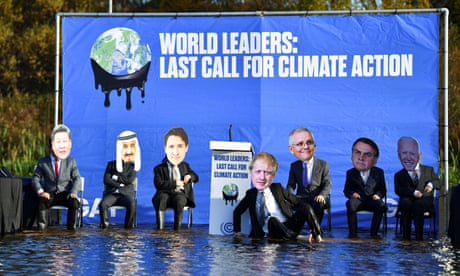Extract from The Guardian
Conflict and Covid make these troubling times, but national leaders must cooperate and take action now.

At the end of February this year, the world’s governments signed on to a statement that was startling in its strength and clarity. “The cumulative scientific evidence is unequivocal: Climate change is a threat to human wellbeing and planetary health,” reads the Intergovernmental Panel on Climate Change report. “Any further delay in concerted anticipatory global action on adaptation and mitigation will miss a brief and rapidly closing window of opportunity to secure a liveable and sustainable future for all.’”
You might think that political leaders could have no higher priority than securing a “liveable and sustainable future”. Is that not what all of us, in every country, need and want for ourselves and for future generations? It is true that other issues are causing grave concern in many societies: governments worldwide are tackling poverty and hunger, wars and civil conflicts, the rising cost of food and energy, health systems and economies crippled by Covid-19.

But as three former UN climate chiefs, let us be clear: as the world’s first major environment summit - the 1972 Stockholm Conference on the Human Environment - recognised, the crises in security, health, development and the environment are linked. They are loading stress upon stress, especially in the most fragile and conflict-torn parts of the world. The myriad reports of extreme weather we have witnessed in 2022 suggest there is no time to waste.
The further climate change progresses, the more we lock in a future featuring more ruined harvests and more food insecurity along with a host of other problems including rises in sea level, threats to water security, drought and desertification. Governments must act against climate change while also dealing with other pressing crises. We recall the Barbados prime minister, Mia Mottley’s words at Cop26: “The leaders of today – not 2030, not 2050 – must make this choice.”
The United Nations Framework Convention on Climate Change was adopted 30 years ago. In our time leading its secretariat, we have witnessed commitments and pledges that have not been fully honoured. While developed countries accepted the convention’s principle of equity and thus their responsibility to lead climate action, their performance has been disappointing, not least in reducing their emissions of greenhouse gases and in mobilising financial support for developing countries that need it.
In the 2015 Paris agreement, all governments agreed to “pursue efforts” to limit global warming to 1.5C (2.7F). We are entitled now to ask where their efforts have reached, where they are heading and how genuine they are. Science shows action this decade to reduce all greenhouse gases is critical. But the sum total of policies in place now will take us to a world hotter by 2.7C and perhaps a catastrophic 3.6C above pre-industrial levels.
If science has not persuaded most governments to act, perhaps economics will. The IPCC provides clear evidence that societies will be more prosperous in a world where climate change is constrained, than in one left to burn. In the energy sector, evidence of the zero-carbon transition is all around us. Wind and solar generation shows compound growth of about 20% a year and is cheaper almost everywhere than the alternatives. Electric car sales doubled between 2020 and 2021.
Unless one is invested in fossil fuels, there is now no reason not to take the clean energy path. Many corporate actors understand the need for early action on this front. But governments still need to incentivise the transition. The evolving Just Energy Transition packages may yet offer an investment pathway that can accelerate deployment in emerging and developing countries. Corporate action towards other targets such as reduction of methane emissions, also needs to be encouraged.
If economics should give us hope for accelerating action despite the host of other issues menacing our times, then so should history. Fifty years ago the international community faced a similar litany of troubles: depletion of natural resources, desertification, the legacy of atom bomb testing, mercury contamination, cold war proxy conflicts. Geopolitics split the world. Yet at the 1972 Conference on the Human Environment in Stockholm, leaders agreed to cooperate on threats faced in common.
Now, with geopolitics made frosty by superpower disagreements and with nations bleeding from Covid and conflict, the world’s people need their leaders once more to work together. Governments have acknowledged that their window of opportunity to avert dangerous climate change is closing and have admitted the perils that failure will bring. Rapidly changing economics mean that a climate-safe future is also a more prosperous one. The will of the public – especially among young people – to see climate change constrained is clear.
As we recall the Stockholm conference on its 50th anniversary this week, we need national leaders to recall what it demonstrated about the potential of cooperative action even in disturbed times. We need to see leaders delivering on their climate change promises, in the interests of people, prosperity and the planet.
Christiana Figueres was executive secretary of UNFCCC from 2010 to 2016, Yvo de Boer was executive secretary of UNFCCC from 2006 to 2010, and Michael Zammit Cutajar was executive secretary of UNFCCC from 1991 to 2002
This article was amended on 2 June 2022 to correct a conversion from celsius to fahrenheit.

No comments:
Post a Comment